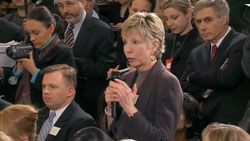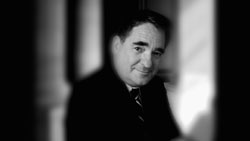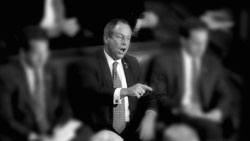Chronology
While some top advisers argue against taking on health reform, "The president was very clear our first year was our best chance to get it done," says White House Communications Director Dan Pfeiffer. He recalls Obama saying, during an Oval Office debate: "It's about health care but it's not really about health care. It's also about proving whether we can still solve big problems in this country."
Seeing lessons in the Clintons' failed health care effort, the White House decides to work closely with Congress. Former congressional insiders are now key Obama aides, notably former Chair of the House Democratic Caucus Rahm Emanuel, who serves as chief of staff in the new administration. Former Senate Majority Leader Tom Daschle (D-S.D.) is asked to take on a dual role as secretary of health and human services, and chair of the White House office of health care reform. But his nomination is derailed by tax problems.
In his joint address to Congress on Feb. 24, the president says health care reform is one of his top priorities. "Let there be no doubt: health care reform cannot wait, it must not wait and it will not wait another year," he says. He announces he plans to bring together a broad group of constituencies -- "businesses and workers, doctors and health care providers, Democrats and Republicans" -- to work on the issue.

Lobbyists and representatives from the medical, hospital, pharmaceutical and insurance industries are among the attendees. Ailing Sen. Ted Kennedy (D-Mass.) makes a surprise appearance.
"The purpose of this forum is … to determine how we lower costs for everyone, improve quality for everyone, and expand coverage to all Americans," says the president. "And our goal will be to enact comprehensive health care reform by the end of this year."
"What was most interesting … was the people who were in the room that day. Many of these players who certainly for years, if not decades, had a record of opposing any sort of health care reform efforts. … Every single one of those people gathered at the March White House summit wanted one thing: a seat at the table," explains Washington Post reporter Ceci Connolly.
The insurance industry pledges support, but it's keyed to the president backing an individual mandate requiring all Americans to buy health insurance. The industry also wants Obama to drop the idea of a "public option" -- a government-run health care plan.
View a list of the attendees here and the forum's final report here [PDF].

Without Daschle and with Sen. Ted Kennedy dying of cancer, the White House turns to Senate Finance Committee Chairman Max Baucus (D-Mont.). A conservative Democrat, Baucus worked with the Bush administration on tax cuts. The view is he can bring moderate Republicans on board.
Baucus's critics raise alarms about his ties to special interests; since 2005, he had received more than $2.5 million from the special interest groups in the health industry. And according to a report from the Sunlight Foundation, five former Baucus staffers, including two former chiefs of staff, work for a total of 27 organizations with an interest in the outcome of health care reform.
In May, the Senate Finance Committee holds hearings on expanding health coverage, calling 41 witnesses. The hearings are interrupted by activists outraged over Baucus's refusal to allow advocates for a single-payer system to testify; Baucus has the activists removed from the hearing and arrested.
Read more on the single-payer option and the arrests of liberal activists in this transcript from Bill Moyers Journal.

Worried about the impact of new legislation the drug industry's top lobbyist, Billy Tauzin, proposes a deal involving a complicated formula, which he says will cut drug costs by $80 billion over 10 years. Accepting the deal means Obama will have to back away from a campaign pledge to dramatically cut drug prices. But, explains Dan Pfeiffer: "They brought stuff to the table and were willing to work with us. And the president said that having people at the table is better than having them throw stuff at the table."
Obama announces the broad outlines of the deal in June, but doesn't mention what he had to give up to get it. But the news leaks to the Los Angeles Times in August; the paper reports details of Tauzin's meetings with the White House and quotes him as saying the deal was "blessed" by the White House. Deputy Chief of Staff Jim Messina confirms a deal to The New York Times the following day.
Read about the details of the PhRMA deal in this story from the Sunlight Foundation.
In early June the president presses lawmakers to pass a bill before Congress' August recess. A few days later The Washington Post's Ezra Klein is leaked an internal Senate Finance Committee memo that outlines the committee's timeline. The ultimate goal is to have a bill on the president's desk by Oct. 1.
The Senate Finance Committee is widely viewed as the committee most likely to draft a bill that could gain bipartisan support. Baucus and five other senators -- Chuck Grassley (R-Iowa), Olympia Snowe (R-Maine), Mike Enzi (R-Wyo.), Jeff Bingaman (D-N.M.) and Kent Conrad (D-N.D.) -- form a "Gang of Six" to try to forge a compromise.
"From January through September, Sen. Baucus and I were … working on what we thought to be not just a bipartisan bill, but a kind of consensus bill -- in other words, something that would get 75 or 80 votes," Sen. Grassley tells FRONTLINE.
But the process bogs down; the Republican leadership pressures its members not to make a deal, and some Republicans are skeptical about the degree of bipartisanship in the Finance Committee's efforts. "I found myself coming out of those secret meetings, those private meetings, and criticizing virtually everything they were doing," Sen. Orrin Hatch (R-Utah) tells FRONTLINE.
Read more about what members of the Gang of Six wanted out of the bill.

There's still no bill when Congress leaves for August recess, and members are met by angry citizens who are anxious about the economy, and outraged about bailouts and expanding government. Much of that anger is focused on health care.
"It was all health care, all the time," recalls Rep. Michael Burgess (R-Texas). "And people were red hot about it. It was a radioactive issue all summer."
"I had people come to my town meeting with sheets of paper that thick off the Internet and quoting from the bill," Sen. Grassley tells FRONTLINE. "I've never had that happen before. People were up on it, and people didn't like what they were reading."

The "lion of the Senate" -- and the most passionate advocate of health care reform -- dies after his struggle with brain cancer. Some hope that his death will change the tone of the debate, both by providing an emotional rallying point for Democrats and by renewing a bipartisan spirit in some of his Republican colleagues.
"I have to look back and say that the death did not make much difference," recalls Sen. Grassley. "There's nobody even as great as the lion of the Senate that can overcome the massive ill feeling about this piece of legislation by the American people at that point."

Hoping to gain back control over the issue, President Obama schedules a prime time speech on health care before a joint session of Congress, pressing legislators to pass a bill. "The time for bickering is over," he says.
But the speech is overshadowed by Rep. Joe Wilson (R-S.C.) shouting "You lie!" when the president says his proposal would not cover illegal immigrants.
"It crystallized this moment in Washington," explains New York Times reporter Peter Baker. "It crystallized the anger. It crystallized the fervor of the opposition."
Two days before the Senate is to vote on the Finance Committee's bill, America's Health Insurance Plans releases a report (PDF) alleging that health care premiums would increase sharply under the bill. "But the importance of that report and its issuance was not really the substance of the report so much as the decision by the industry to put it out there," explains Washington Post reporter Ceci Connolly. "It was the clearest signal in this long drama that the insurance industry was not going to be on board with any sort of health care reform."
On Oct. 13, the health care bill passes the Senate Finance Committee with the support of only one Republican, Sen. Olympia Snowe of Maine. Following the bill's passage, Senate Majority Leader Harry Reid (D-Nev.) takes back control of the bill -- talk of a public option is back on the table and the individual mandates that the insurance industry had fought for are watered down.
And the following Saturday, the president takes on the insurance industry in his weekly Internet address: "They're flooding Capitol Hill with lobbyists and campaign contributions, and they're funding studies designed to mislead the American people," he says. "It's all smoke and mirrors. It's bogus."
But Karen Ignani and her allies fight back by funneling millions of dollars into a tough ad campaign against the legislation sponsored by the Chamber of Commerce.
And the insurance industry's arguments hold sway with a number of key senators. The White House and the Democratic leadership begin cutting deals; they kill the public option, pleasing Sen. Joe Lieberman and others; they lower proposed taxes for medical device makers to win Sen. Evan Bayh's (D-Ind.) support.
The last holdout is Sen. Ben Nelson (D-Neb.), a former insurance industry executive. He agrees to support the bill if he can get a $100 million deal in which the costs of expanding Medicaid in Nebraska would be covered by U.S. taxpayers. Sen. Nelson denies there was a quid pro quo for his vote, saying instead he was opening the door for all states to receive similar Medicaid compensations. But Washington and the media see it differently; the deal becomes known as the "Cornhusker Kickback."
In a rare Christmas Eve session, the Senate passes the health care bill by a vote of 60 to 39. The House had passed its version -- which included a public option -- in early November. After the holiday break, House and Senate negotiators begin talks to reconcile the differences between the two bills.

On Jan. 19, the state's voters go to the polls in a special election to elect a senator to fill out the remainder of Ted Kennedy's term. Though the president makes a last-minute trip to Boston to campaign for Democratic candidate Martha Coakley, by election day it is clear in the White House that she will lose to State Senator Scott Brown, who is riding a wave on his pledge to be the 41st vote against health care.
That night, before the polls close in Massachusetts, an emergency meeting is convened in the White House; it's attended by the Democratic congressional leadership. The president asks Speaker of the House Nancy Pelosi if she can muster the votes to have the House pass the Senate bill.
"Pelosi is annoyed, and quite adamant that there's no way she can sell that to her House members," recounts Washington Post reporter Ceci Connolly. "And Obama finally snaps, uncharacteristically for him, and he says: 'I understand that Nancy. What's your suggestion?' And there is no suggestion."

In the days after Brown's election, the president formulates a new plan -- he himself will sell the bill to Congress and the public. And the White House and Speaker Pelosi will work to get enough Democrats in the House on board to pass the Senate bill.
"The president said to us that he would do anything, he will call anyone, meet with anyone. He will speak anywhere. He will do whatever it takes to make the case," recalls White House Communications Director Dan Pfeiffer.
In his State of the Union address on Jan. 27, the president again urges Congress to pass health reform. "As temperature cool, I want everyone to take another look at the plan we've proposed," he says. "But if anyone from either party has a better approach that will bring down premiums, bring down the deficit, cover the uninsured, strengthen Medicare for seniors, and stop insurance company abuses, let me know. I'm eager to see it."
On Feb. 25, Obama follows up on that request for ideas by holding a seven-hour televised bipartisan summit at Blair House He tangles with Republicans over details in the bill, and at the end of the day warns that Democrats will pass the bill alone if Republicans are unwilling to join.
"That was, I think, the moment that he stepped up in a way that he hadn't before," says Washington Post reporter Dan Balz. "He took ownership of this health care issue. He challenged everybody on this front."
"The summit also brought them, and in particular Nancy Pelosi, time," explains Washington Post reporter Ceci Connolly. "After the Massachusetts election, there was this constant drumbeat in Washington of, 'What are you going to do? How are you going to rescue health care?' And the White House in particular needed to get a little bit of breathing room from that terrible period of anxiety and panic that was occurring in the Democratic ranks, and right the course of action."
The White House cuts a last, pivotal deal just hours before the vote: it promises anti-abortion Democrats an executive order that ensures no federal funding from the bill will be used to fund abortions. Without a single Republican vote, the House passes the Senate bill 219 to 212. Two days later, President Obama signs his landmark health care reform bill.